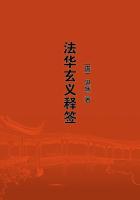Farewell, of women born the best;
Good-bye! the saddest of good-byes.
Farewell! with many vows and sighs My sad heart leaves you to your rest;Farewell! the tears are in my eyes;
Farewell! from you my miseries Are more than now may be confessed, And most by thee have I been blessed, Yea, and for thee have wasted sighs;Goodbye! the last of my goodbyes.
ARBOR AMORIS.
FRANCOIS VILLON, 1460
I HAVE a tree, a graft of Love, That in my heart has taken root;Sad are the buds and blooms thereof, And bitter sorrow is its fruit;Yet, since it was a tender shoot, So greatly hath its shadow spread, That underneath all joy is dead, And all my pleasant days are flown, Nor can I slay it, nor instead Plant any tree, save this alone.
Ah, yet, for long and long enough My tears were rain about its root, And though the fruit be harsh thereof, I scarcely looked for better fruit Than this, that carefully I put In garner, for the bitter bread Whereon my weary life is fed:
Ah, better were the soil unsown That bears such growths; but Love instead Will plant no tree, but this alone.
Ah, would that this new spring, whereof The leaves and flowers flush into shoot, I might have succour and aid of Love, To prune these branches at the root, That long have borne such bitter fruit, And graft a new bough, comforted With happy blossoms white and red;So pleasure should for pain atone, Nor Love slay this tree, nor instead Plant any tree, but this alone.
L'ENVOY.
Princess, by whom my hope is fed, My heart thee prays in lowlihead To prune the ill boughs overgrown, Nor slay Love's tree, nor plant instead Another tree, save this alone.
BALLAD OF THE GIBBET.
[An epitaph in the form of a ballad that Francois Villon wrote of himself and his company, they expecting shortly to be hanged.]
BROTHERS and men that shall after us be, Let not your hearts be hard to us:
For pitying this our misery Ye shall find God the more piteous.
Look on us six that are hanging thus, And for the flesh that so much we cherished How it is eaten of birds and perished, And ashes and dust fill our bones' place, Mock not at us that so feeble be, But pray God pardon us out of His grace.
Listen, we pray you, and look not in scorn, Though justly, in sooth, we are cast to die;Ye wot no man so wise is born That keeps his wisdom constantly.
Be ye then merciful, and cry To Mary's Son that is piteous, That His mercy take no stain from us, Saving us out of the fiery place.
We are but dead, let no soul deny To pray God succour us of His grace.
The rain out of heaven has washed us clean, The sun has scorched us black and bare, Ravens and rooks have pecked at our eyne, And feathered their nests with our beards and hair.
Round are we tossed, and here and there, This way and that, at the wild wind's will, Never a moment my body is still;Birds they are busy about my face.
Live not as we, nor fare as we fare;
Pray God pardon us out of His grace.
L'ENVOY.
Prince Jesus, Master of all, to thee We pray Hell gain no mastery, That we come never anear that place;And ye men, make no mockery, Pray God pardon us out of His grace.
HYMN TO THE WINDS.
DU BELLAY, 1550.
[The winds are invoked by the winnowers of corn.]
To you, troop so fleet, That with winged wandering feet, Through the wide world pass, And with soft murmuring Toss the green shades of spring In woods and grass, Lily and violet I give, and blossoms wet, Roses and dew;This branch of blushing roses, Whose fresh bud uncloses, Wind-flowers too.
Ah, winnow with sweet breath, Winnow the holt and heath, Round this retreat;Where all the golden morn We fan the gold o' the corn, In the sun's heat.
A VOW TO HEAVENLY VENUS.
DU BELLAY, 1500
WE that with like hearts love, we lovers twain, New wedded in the village by thy fane, Lady of all chaste love, to thee it is We bring these amaranths, these white lilies, A sign, and sacrifice; may Love, we pray, Like amaranthine flowers, feel no decay;Like these cool lilies may our loves remain, Perfect and pure, and know not any stain;And be our hearts, from this thy holy hour, Bound each to each, like flower to wedded flower.
TO HIS FRIEND IN ELYSIUM.
DU BELLAY, 1550.
SO long you wandered on the dusky plain, Where flit the shadows with their endless cry, You reach the shore where all the world goes by, You leave the strife, the slavery, the pain;But we, but we, the mortals that remain In vain stretch hands; for Charon sullenly Drives us afar, we may not come anigh Till that last mystic obolus we gain.
But you are happy in the quiet place, And with the learned lovers of old days, And with your love, you wander ever-more In the dim woods, and drink forgetfulness Of us your friends, a weary crowd that press About the gate, or labour at the oar.
A SONNET TO HEAVENLY BEAUTY.
DU BELLAY, 1550.
IF this our little life is but a day In the Eternal, - if the years in vain Toil after hours that never come again, -If everything that hath been must decay, Why dreamest thou of joys that pass away, My soul, that my sad body doth restrain?
Why of the moment's pleasure art thou fain?
Nay, thou hast wings, - nay, seek another stay.
There is the joy whereto each soul aspires, And there the rest that all the world desires, And there is love, and peace, and gracious mirth;And there in the most highest heavens shalt thou Behold the Very Beauty, whereof now Thou worshippest the shadow upon earth.
APRIL.
REMY BELLEAU, 1560.
APRIL, pride of woodland ways, Of glad days, April, bringing hope of prime, To the young flowers that beneath Their bud sheath Are guarded in their tender time;April, pride of fields that be Green and free, That in fashion glad and gay, Stud with flowers red and blue, Every hue, Their jewelled spring array;April, pride of murmuring Winds of spring, That beneath the winnowed air, Trap with subtle nets and sweet Flora's feet, Flora's feet, the fleet and fair;April, by thy hand caressed, From her breast Nature scatters everywhere Handfuls of all sweet perfumes, Buds and blooms, Making faint the earth and air.















